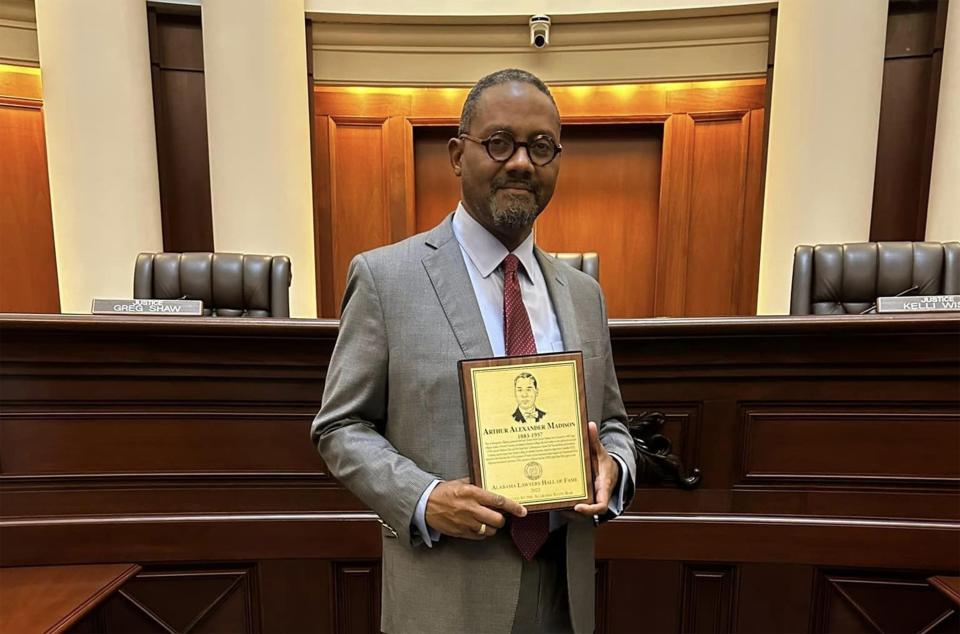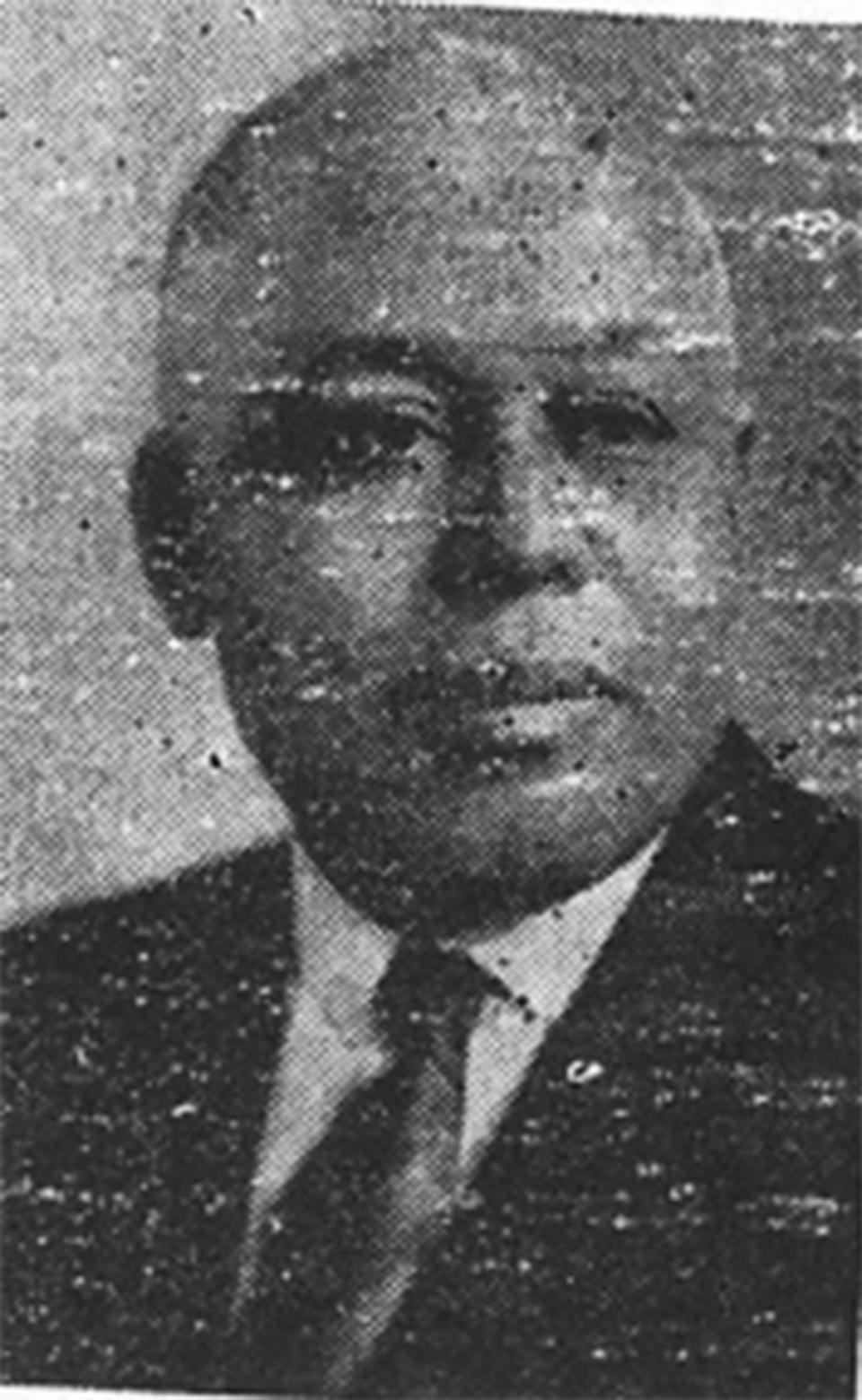Arthur Madison and the long afterlife of courage
- Oops!Something went wrong.Please try again later.
We’re going to interrupt the jeremiads of this space for some good news.
Back in February, I wrote about Arthur Madison. For those who don’t remember, Madison was an attorney who Alabama disbarred in 1944 — on highly questionable grounds — after he tried to register Black voters in Montgomery.
“If you’re a lawyer, that is the ultimate disgrace,” says his great-nephew, Quinton Seay.
But refusing to acknowledge defeat, Madison came back and helped register hundreds of Black men and women on the voter rolls. Rosa Parks asked him to be present when she registered to vote in 1945.
Madison died in 1957. The state of Alabama still lists him as disbarred.
That may be about to change.

This month, Madison was inducted into the Alabama State Bar’s Hall of Fame. The citation praises Madison for his voting rights work, his educational attainments and his entrepreneurial spirit.
Seay, an attorney in Atlanta, accepted the award. Seay told me last week that the honor, while appreciated, sparked some questions.
“Folks in the family immediately said, ‘How can they induct him into the Hall of Fame while he’s still disbarred?’” he said.
Seay is working on that.
Quinton Seay comes from a long line of civil rights heroes. His grandfather, Solomon Seay Sr., was Madison’s brother-in-law and attended his trial in 1944. Later, Seay played a major role in the Montgomery Bus Boycott and sheltered the Freedom Riders from a white mob. White thugs later shot at Seay, hitting his wrist, but he survived.
His father, Solomon Seay Jr., worked alongside Fred Gray. He provided legal counsel to the Freedom Riders; secured the Selma-to-Montgomery march and fought for compensation for the victims of the Tuskegee Syphilis Experiment.
To Quinton Seay, Madison called Alabama to live by the principles of the Declaration of Independence and the Constitution.
“What he was trying to do was protect the Constitution,” he said. “That’s what he was trying to do. He believed in the Constitution, regardless of how Black folk had been treated. He was trying to ensure this country lives up to the principles in those two documents.”
Seay said he plans to file a petition this summer — perhaps in late July or early August — to restore Madison’s law license. He said he heard encouragement from other judges and attorneys at the Hall of Fame ceremony.

You may ask what the point of all this is. Madison has been dead for more than 60 years.
Slavery and legal segregation are gone, but the wounds it inflicted on this state — in education, in health care and in economic attainments — are still open. What does a gesture like this do to fix all that?
Seay says it would be a sign of reconciliation, and that it would send a message that Alabama is trying to move on from its awful past.
“It shouldn’t have taken this much time, but it says the state fixed this situation and restored his bar license,” he says.
I’d add this. In a time when we have to seriously consider the possibility of authoritarians capturing the federal government, Madison gives me hope.
Despair is hard to keep at bay when a shift of a few thousand votes in a single state could mean pointless suffering for any number of people.
So we stay on edge. We mumble “the price of liberty is eternal vigilance” under our breath, the way my mother would pray the Rosary. We hear, over and over again, that evil triumphs when good people do nothing.
But what happens when good people do something?
What happens when a person fights for basic decency, scorning the danger and the long odds of success?
Arthur Madison didn’t break Jim Crow or voter suppression in 1944, or in any of his subsequent trips to the state.
But he made it harder for the oppressors.
White registrars who had casually denied Black Montgomerians the right to vote suddenly had to face the possibility of a lawsuit for their racism. Slowly, and without abandoning the basic discriminatory patterns, they started registering obviously qualified Black residents. By 1953, there were enough registered Black voters in the city to elect a racial liberal (for the time) to the city commission.
Most importantly, Madison’s work drew other courageous people. Parks. E.D. Nixon. Solomon Seay Sr. These three played major roles in organizing the Montgomery Bus Boycott, which — through 382 difficult and often terrifying days — set Jim Crow on the road to extinction.
It’s easy to give into despair when the powerful seem so deaf to the calls of citizens and so stubbornly determined to hurt people who lack their wealth, connections or resources. The Alabama House and Senate do their work in front of public galleries that are sealed behind soundproof glass.
But think of all the people who have assembled at the Statehouse over the last two decades.
Former inmates and their families. People struggling with health bills. Immigrants trying to live in peace. Women demanding to be treated as American citizens.
Just last week, LGBTQ Alabamians, facing an avalanche of hateful legislation, rallied to demand the respect due to them. And Chinese Alabamians spoke out against a paranoid law that would have prevented them from owning property in the state.
All saying, firmly and unmistakably, that they will not meekly submit to the decisions of the powerful.
I don’t know what the future holds. But history tells us that these efforts are never in vain. Arthur Madison’s brave stand rippled forward in ways he could not have imagined.
Courage echoes far beyond the limits of a human life. So too will the work of the brave men and women who stand up for their fellow Alabamians. Like Madison, they show us a better future.

Brian Lyman is the editor of Alabama Reflector. He has covered Alabama politics since 2006, and worked at the Montgomery Advertiser, the Press-Register and The Anniston Star. His work has won awards from the Associated Press Managing Editors, the Alabama Press Association and Robert F. Kennedy Center for Human Rights. He lives in Auburn with his wife, Julie, and their three children.
Alabama Reflector is part of States Newsroom, an independent nonprofit website covering politics and policy in state capitals around the nation.
This article originally appeared on Montgomery Advertiser: Arthur Madison and the long afterlife of courage

